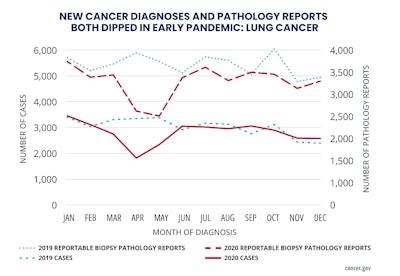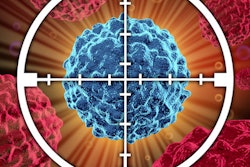New diagnoses of six cancer types in the U.S. fell sharply in early 2020, coinciding with the start of the COVID-19 pandemic, according to the National Cancer Institute's (NCI) Part 2 Annual Report to the Nation on the Status of Cancer.
Additionally, the volume of pathology reports also declined in early 2020, which suggests that fewer cancer screenings and other cancer-related procedures were being performed. The findings -- published September 27 in Cancer -- underscore that cancers were not being identified in a timely fashion during the early days of the COVID-19 pandemic.
"These missed opportunities for early cancer detection are alarming, particularly for those vulnerable populations that continue to face significant barriers in accessing cancer care," said NCI director Monica Bertagnolli, MD, in a statement released by the institute. "This report highlights the urgency in helping all Americans get back on track with their cancer care so that we can avoid unnecessary deaths and complications from cancer."
The document included analysis of data from population-based cancer registries that participate in the Centers for Disease Control and Prevention's (CDC) National Program of Cancer Registries or NCI's Surveillance, Epidemiology, and End Results (SEER) program. A team led by Serban Negoita, MD, PhD, of the NCI assessed the number of newly diagnosed cases of female breast, lung, and colorectal cancers (diagnosed through screening tests that were disrupted by the pandemic); thyroid and prostate cancers (often diagnosed incidentally); and pancreatic cancer (usually diagnosed when a patient presents with symptoms). It also compared the volume of electronic pathology reports sent to cancer registries in 2020 to those sent in 2019.
Overall, the investigators found that from March to May 2020, diagnoses of all six cancer types fell sharply, although by July of that year, diagnoses of all cancer types except prostate had returned to prepandemic levels. The team also stated that, over the same period in early 2020, the volume of electronic pathology reports declined steeply before returning to pre-pandemic levels and noted that "because these reports are transmitted automatically to cancer registries, the findings suggest that the decline in new cancer diagnoses was not due to delays in reporting caused by pandemic disruptions but rather to missed screenings and delays in other cancer-related procedures."
The report also found the following:
- For each cancer type in the study, new cases of early-stage cancers fell more sharply than new cases of advanced cancers.
- The declines were greatest for the cancers typically diagnosed through screening (female breast, lung, and colorectal cancer). "For example, 7,147 cases of early-stage colorectal cancer were expected to be diagnosed in 2020, but only 5,983 cases were diagnosed -- meaning that potentially more than 16% of early-stage colorectal cancer cases weren't caught," the group noted.
- Asian or Pacific Islander populations had greater declines in new cases of all cancer types, except for pancreatic cancer, compared with white, Black, and American Indian or Alaska Native populations, according to the researchers.
 Lung cancer diagnoses fell from March 2020 to May 2020, one of six major cancer types to experience a dip during the early part of the pandemic. Graph courtesy of the NCI.
Lung cancer diagnoses fell from March 2020 to May 2020, one of six major cancer types to experience a dip during the early part of the pandemic. Graph courtesy of the NCI.
"This study is a reminder that a decline in cancer incidence may not always reflect progress in the fight against cancer,” said Betsy Kohler, executive director of the North American Association of Central Cancer Registries in the NCI statement. "We are currently conducting more in-depth analysis of the full 2020 data to further understand the implications of the pandemic on cancer outcomes."
Part 2 Annual Report to the Nation on the Status of Cancer is a joint effort among NCI, the Centers for Disease Control and Prevention (CDC), the American Cancer Society, and the North American Association of Central Cancer Registries (NAACCR). It is intended to provide information about cancer occurrence and trends in the U.S. Part 1 of the report was published in October of last year.
The complete document can be found here.




















